There are now 1.8 million foreigners working in Japan, including real estate agents, taxi drivers and garbage collectors. NHK WORLD-JAPAN has introduced over 100 such hardworking foreigners, and this program compiles some of the best stories. We look at how they struggle in the face of cultural differences, but bring about change in Japanese companies and society. The host is Sanyutei Kouseinen, a rakugo performer from Sweden.
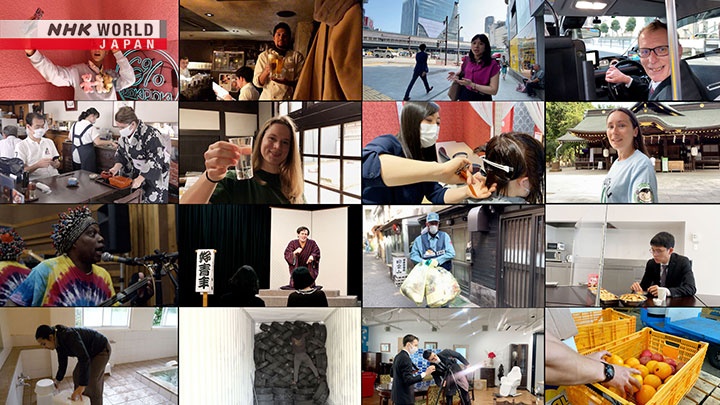
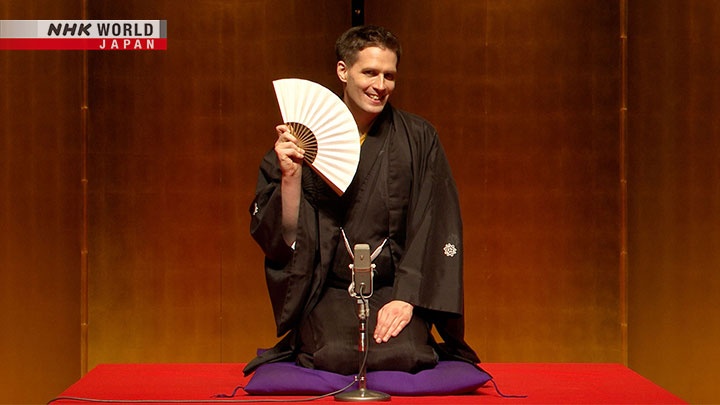
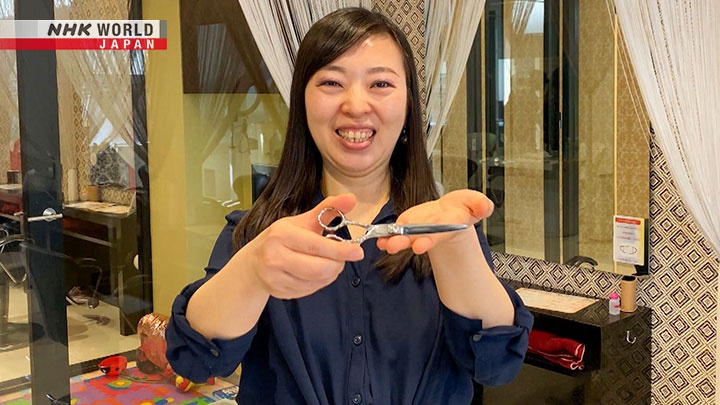
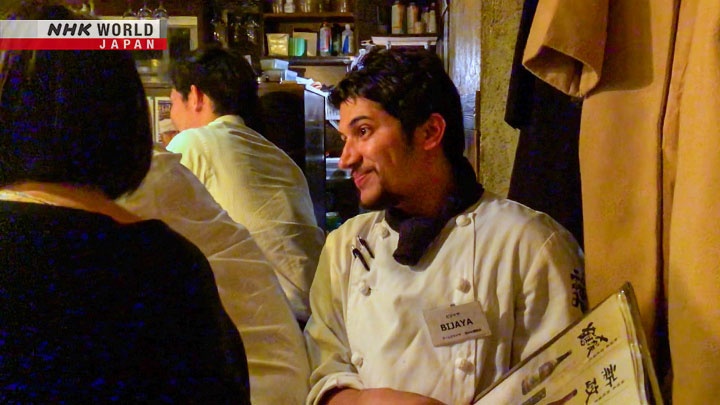
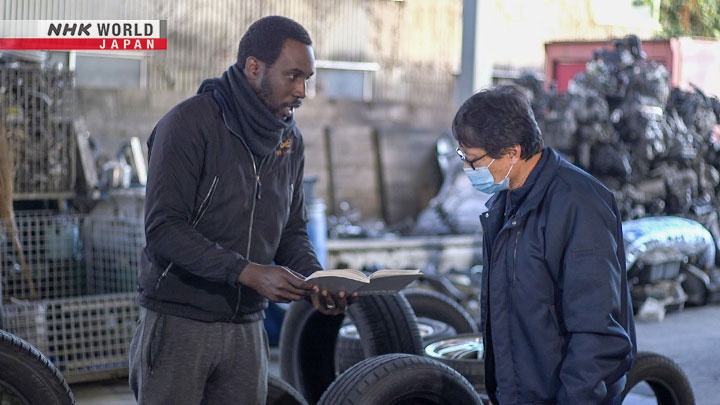
Transcript
Japanese workers are known for their diligence.
For centuries, many have found genuine joy in their work.
How about today?
There are many people from around the world who work side by side with Japanese colleagues.
Just how many? Around 1.8 million!
Hi I'm Kristen, welcome to our eel restaurant!
"Thank you."
NHK WORLD-JAPAN has visited these folks in over a hundred workplaces around the country.
Today, we'll be revisiting a few of our favorite stories.
Let's explore the changing future of Japan.
I'm Johan Nilsson Björk, or Sanyutei Kouseinen, and will be your host today.
I'm from Sweden, and I work as a professional rakugo storyteller.
Let's meet some of my fellow global workers.
Ladies and gentlemen. So nice to have you all here.
My name is Sanyutei Kouseinen, and I'm a professional rakugo performer, "rakugoka," from Sweden.
Working in Japan can be a bit hard because there's a lot of differences - cultural differences.
For example, Japanese people are very, very strict about time.
When I first came here, I was very surprised about this.
In Sweden, if you're late like, say, five minutes, that's not such a big deal, you know?
But in Japan, if someone says you should come by 1:00, you should be there at 1:00, the latest.
Even one second, one second late means that you will get yelled at.
However, since Japanese are so strict about the beginning of the meeting,
you'd think that they'd end on time but - no, no, no, no.
If say, the meeting is supposed to end at 5:00, then it's like,
"oh, it's 5: 00 now so we can all go home, right?" But, no one is moving.
Everyone's just sitting there and continuing.
And if I, for example, say, "well, it's 5:00 now, so, I'm going home. See you!"
Then they'll all be very, very upset, you know -
"What's that guy's deal?"
So, it's, I'm not really sure what to do about this.
So, today, you're going to see a lot of videos about other people who are working in Japan right now.
Ota Market, Tokyo.
This is the largest fruit and vegetable marketplace in Japan.
Hello, I'm Kosim.
I work for a wholesaler
here at the Ota Marketplace.
Judo practitioner Kosim had always wanted to come to Japan.
An acquaintance found him work at this company.
Every day, more than 200 kinds of fruit
and vegetables are brought here.
I choose produce to fill up orders
and place them in containers.
Five packs of eggplants.
One pack of small green onions.
Clients include supermarkets, restaurants, and hotels.
Their orders change daily.
It was hard at first.
In Tajikistan, we don't use so many
kinds of vegetables in our cooking.
I often mixed up Japanese honewort
and coriander.
They look very much alike.
It's the same with small green onions
and garlic chives.
He first started the job in order to provide for his family.
He had plenty to learn. Writing up documents presented a challenge.
Tell me if you make a mistake!
A strict but helpful senior colleague was there to help him out of trouble.
Tanaka-san was very strict
with me in the beginning.
But thanks to her, I learned
all the tasks my work involves.
And I was able to improve.
Tanaka explained to Kosim that customers in Japan have high expectations.
Even we occasionally get complaints
about our products.
Clients complain directly
to the sales reps over the phone.
If Kosim can learn to properly
do the work right from the start,
I know he'll do an amazing job
in the future.
That's why I have to be strict with him.
Kosim learned that Japanese customers place a much higher value on freshness than back home in Tajikistan.
I have to carefully check every apple.
This one's bad.
It's bad for customers.
When I worked in Russia and Tajikistan,
we didn't sort out products so thoroughly.
Since I joined a Japanese company,
I've really come to understand
'The client comes first.'
It's a customer-first approach he's learned in Japan.
Hi. Welcome.
I'm Yu Mei.
I work at this hair salon.
Come in!
I'm well trained in the basics of styling.
I can give you any haircut you want.
Leave it to me.
Mei is from China. She is a popular hairstylist here.
Welcome.
She always makes sure to check every detail with customers before starting a cut.
- What length?
- Could you trim about 2cm?
- A bit shorter here?
- Yes.
- Like this?
- Nice.
She asks many questions to ensure that she can give the customer exactly what they want.
If they're happy with the result, they'll ask for her again and become a regular.
Understanding what your
client wants is key.
No matter how busy I get
I pay attention to each person.
Mei came to Japan in 2004 as a dancer.
She married a Japanese man.
They had 2 children but then got divorced.
Mei decided to become a hairstylist.
She earned her beautician's license, hoping to achieve a stable income.
When I introduced myself my accent
showed I wasn't Japanese.
Then some would ask for
a Japanese stylist instead.
When I asked them why, they said
they worried about communication.
Manager Yokota explained the secret to communicating with Japanese clients.
Mei's very frank and straightforward.
She wanted customers to make up
their minds: cut more, or stop?
I told her if they sound noncommittal
it means they want it a tiny bit shorter.
Thanks to her advice, I was able
to understand Japanese customers more.
The advice helped Mei communicate more smoothly with customers.
- How does it look?
- Nice.
- All done!
- Thank you.
I'm glad I can get the same cut as usual.
It's thanks to Mei.
Take care.
Thank you!
It's been two years since our visit.
Hello.
When we called in on Mei at home, her circumstances had changed.
My father.
He's come from China.
With a stable income in Japan, she was able to bring her father over.
They now live together.
Dinner's always hard.
Dad's not used to Japanese food yet.
She alternates between having her mother and her father for six months at a time.
Once they both get used to life in Japan, she hopes they can all live together.
It's a shared dish.
Don't eat with those!
Not used to that.
- Is it good?
- Good.
- Not too salty?
- It's just right.
She couldn't cook as a girl.
She's really grown in Japan.
Not just cooking and work.
Her general behavior is more mature.
She's raising her kids well too.
It's a relief.
She's worked really hard on things
she wasn't good at too.
Working hard means I can
look after my parents.
I'll keep at it and look forward
to living with Dad.
There's one item that Mei says she can't live without.
These scissors are my treasure.
They're my tool to earn a living.
They're like a part of me.
I use them to cut myself a path forward.
In Japanese, there's a word called "ganbaru," which is a bit hard to translate, but it is generally,
it means to do your best; to work really diligently
and this is the most important thing I think in Japan.
And this is what will make the Japanese people accept you.
Once you are accepted, Japan is really, really, really nice.
Really kind place, I think.
So, this is what I try to do all the time.
So, let's have a look at what I'm doing here in Japan.
My workplace is in downtown Tokyo.
Please don't roll your eyes
at this blue-eyed rakugo artist.
Rakugo storytelling has hundreds of years of history.
One performer portrays all the characters.
I'm performing a comedy about a boy who tricks his father into giving him money.
Son: A little something?
Father: What?
Son: A little something?
Father: Loud and clear,
like a man!
Son: Alright, if you're sure,
but don't be upset.
Son: Hand over the money!
Father: You're robbing me?
I became fascinated by rakugo while I was studying in Japan.
After graduation, I went home to Sweden, but I couldn't stop thinking about rakugo.
I was apprenticed to a famous storyteller in 2016.
In rakugo, you got three different stages.
When you become a proper apprentice, you become a zenza, which is the apprentice,
and then you become futatsume, and then shin'uchi.
I completed my 4-year training and became futatsume in 2020.
I was given a new stage name.
Sanyutei Kouseinen, this is the name I got from my master.
Kouseinen, this means...
Well, if you translate it, it becomes kind of like 'nice guy,' or like 'handsome guy.'
So, it's a very odd word to have as a name, but I'm going to try to become a 'nice guy' when I perform.
For me, learning Japanese courtesy was even harder than the rakugo training.
It was beaten into me that even tiny gestures come through in the performance.
You fold it so neatly!
I was taught it
as part of my training!
As I struggled to learn, I had an older colleague who watched out for me.
Our culture is completely different from his.
There were many things
he didn't know
like how you mustn't step
on the edges of tatami mats.
He didn't know what
to pay attention to at first.
I was so stressed, unable to relax
and always looking around.
Once, when he'd been scolded
one too many times
he grabbed his shirt and ripped it open
to calm himself down.
Everything I learned in training
improved me as a rakugo artist.
It was hard but useful.
To become shin'uchi, I have to train for around 10 more years.
They say you must 'steal'
your seniors' techniques.
I'll keep watching my seniors
to continue to improve as a performer.
Well, I would say everyone's trying to find a place they belong.
Depending on the person, this could be the town you're born in, but some people,
they go all over the world, trying to find somewhere where they feel comfortable, where they feel like they belong.
Sometimes this might be somewhere, really, really far away just like Japan.
Everyone's trying to find the place where they belong.
Hello. I'm Andrew. I work here at a real estate agency
and I would love to show you how finding an apartment in Japan goes.
The first challenge global workers face in Japan is finding somewhere to live.
This agency offers multilingual support.
Andrew handles the English inquiries.
Let's go ahead and I can call you back in, probably like 10, 15 minutes at the most.
Let's go.
Hello Phil.
I just arrived at the apartment.
Today, he has an Australian client who asked for a virtual tour.
The kitchen has a two gas grill, stovetop burners.
And then it has a pretty deep closet.
I'm over here in the living room.
This is an 11.7 tatami mat size room.
He goes in-depth to make sure that, yeah, that we understand everything,
obviously in the way that things are done here in Japan.
He's got a great understanding of it and then, makes it a lot easier and a lot clearer to understand.
Andrew came to Japan 12 years ago.
Working at the real estate agency made him realize he was in a position
to help other international people struggling to find a home.
Fifty percent of owners, they are very against having foreign residents in their buildings as tenants
because maybe they don't know about separating the trash
or typical things that, like, not wearing shoes inside the house.
If we can give them a really good experience and connect them to their living situation early
and successfully that will continue to help their path as they start their adventure here in Japan.
To head off potential issues with landlords, Andrew has started a new project with his colleagues.
It's a series of videos about living in Japan, with English explanations.
Make sure to tie bags properly and place the trash
bags in the correct place and on the correct day.
Separating trash helps the environment
and is a rule for most apartments in Japan.
These videos have halved the complaints they receive from Japanese landlords.
Finding a home is a major first step.
Andrew's job is a very special one.
The city of Fuchu is located about 20km from central Tokyo.
In addition to its handy location, it also has a charming historic appeal.
Let's meet the person in charge of the city's PR.
OK. I'm going to take photos to promote the city.
Anika's job is to capture and communicate the charms of Fuchu.
She publishes English articles on social media, hoping to encourage more foreign tourism.
Fuchu has so many beautiful spots.
Doing PR for the city has been an amazing adventure because it lets me discover the city more and more every day.
Today, she's visiting a facility that preserves traditional Japanese homes.
Hi! Nice to meet you.
The thatched roof of this house
is made of straw.
In the heat of summer it attracts insects,
and moss can grow when it rains.
So, a fire has to be lit regularly.
The smoke is getting in my eyes!
We have a very traditional setting that, normally, you cannot find just anywhere.
So, it brings good memories of old Japan.
Here's the same building.
The most important is to cover the history of the place I'm writing about,
and also to convey something super special about the place that nobody knows,
and is not on the Internet; that you can only hear from local people.
Anika applied for the city hall job in 2018, and has been working there ever since.
Fuchu city hall was looking for one foreigner to do PR.
Of course, it was before the 2019 Rugby World Cup and the Olympics.
So, I think that the timing was perfect.
Her presence has brought about new inspiration for Japanese staff too.
Basically, I let her choose whichever
place or event she wants to report on.
As a non-Japanese, her opinions
are unique and valuable to us.
Her sensibility is very important.
It helps us realize
the things we need to change
and improve upon.
At first, Anika focused on promoting events likely to appeal to foreign visitors such as local festivals.
But with the COVID-19 pandemic, festivals and other traditional events were canceled.
I was worried if I could continue my work.
How can I do... How can I promote the city?
How can I show hospitality if I can't meet tourists? I was worried.
But then... then I noticed that Fuchu is not only about festivals or events; there's so much more!
Now, Anika also records the everyday lives of locals.
It looks delicious! So delicious!
Before 'corona,' I was very busy with events...
...and I couldn't find enough time to talk to local people.
And now, I have more time to make more friends.
Two years later, how is Anika doing?
One of my favorite cafes in Fuchu.
She spends more time with Japanese friends on her days off.
My friend and colleague,
Nakamura Saya.
When Anika first came to Japan, most of her friends were from other countries.
At first English was easier for me.
I didn't really focus on my Japanese.
But many of those friends returned to their countries during the pandemic.
Anika needed to make a change.
I wanted to build long-term friendships
here in Fuchu so I studied hard.
- You don't cook?
- No time...
But I'll cook Polish dishes
for a future boyfriend!
Anika is determined to improve her Japanese even further,
make more Japanese friends, and put down roots in Fuchu.
It's her new home.
Sometimes foreigners get lost
looking for where they belong.
I was lucky to find home right here.
I want to hold on tightly to this treasure!
We still have so many people to meet!
Their work is helping support Japanese society.
Welcome aboard.
I'm Wolfgang Loger.
Hello.
Turn right at the intersection
then head for Otemachi.
Yes, ma'am.
Are you from Germany?
I'm from Austria.
I studied in Germany for a short while.
- Danke schön.
- Oh, memories!
Thank you!
Hello. So windy today!
What brought you to Japan?
Well, I've been here for
more than 20 years.
Aha... you fell in love with
a Japanese woman.
Yes, that happened along the way!
After working as a restaurant chef,
Wolfgang became a taxi driver at 50.
He likes that he can arrange his own work schedule.
We do have long shifts, but we
always get the next day off.
I think I'II go out for lunch
with my wife tomorrow.
I think eel's known as being really good for you; it has, like, a lot of nutrients.
We definitely eat eel in, like, special times and it's kind of associated with happy things, and, kind of like, a special occasion.
This is our most popular dish.
The restaurant has been in business
for more than 80 years.
25 years ago, Kristen married a Japanese man
who was the restaurant's third-generation owner.
If we had different careers, I think it would be a little bit harder to do, but because we work together,
so we have the same kind of goals for the restaurant and then but also,
you know, for the kids and the family, so it's...
allows us to really, kind of, be on the same... on the same path.
He doesn't use sheet music,
encouraging students to feel the rhythm with their bodies.
There were no music schools in Africa before.
Kids listen to their mothers
sing as they mill corn.
They're strapped to their
mother's back.
They gain a natural sense of rhythm.
Hi! I'm Will Rhodes. I work as a garbage collector in Japan.
Gotta collect in small alleys, too.
Thank you.
He's such a hard worker.
I like him.
Thank you.
Will did the same job in Australia.
In Australia, garbage is collected
by a machine.
We sit in the truck all day.
It's not like Japan.
Residents in Japan greet us
and encourage us.
Letters of thanks from residents
are on display at the processing facility.
Thanks for your hard work.
There's some glass in there. Be careful.
To the people who collect our garbage,
thank you!
Thank you as always.
Working in Japan like this, of course, this will be good for your own experience, for your own career,
working hard can not only help yourself, but little by little,
this can also change Japan's society itself.
Sendai, in Japan's northeast.
Hi, I'm Mouhamadou.
I sell used tires in Japan and overseas.
When we check tires, we must think
of the end user's safety.
Good morning.
I came to take a look at your tires.
Mouhamadou's job is to buy serviceable used tires
from gas stations and other businesses for export.
He has a dream that his job in Japan will help him fulfill.
Many young people in Senegal are in need
of work, and wealth disparity is high.
So I came to think studying business
would be a better contribution to Africa.
After graduating business school in Japan,
Mouhamadou joined a firm with ambitions to expand into Africa.
Bonjour, how are you?
He's in charge of expanding the business abroad.
The company is eager to encourage Mouhamadou's dream of supporting his country.
I said we wanted to open a branch in Senegal.
When I spoke about using the experience
he'd learn here,
his eyes lit up and were wide open.
It left a strong impression on me.
Mr. Kawamura put his trust in me
and offered me a job.
In 2018, Mouhamadou opened a branch in Senegal.
He hired young Senegalese staff, and in four years, sales in the country have doubled.
Compared to most youths in Senegal,
I've had many opportunities.
I want to help them by
creating jobs for future generations.
Ginza is a famously competitive restaurant district in Tokyo.
Yet one manager has continued to increase sales.
Welcome!
Hello, my name is Bijaya.
And today I'll introduce the place where I am working.
This is a Japanese izakaya.
Izakaya are Japanese-style dining bars.
This one is part of a chain with 19 locations in Japan.
In 2014, Bijaya became the firm's first non-Japanese salaried employee,
and in just four years, he was promoted to manager.
Good afternoon!
Our sales goal today is 3,700 US dollars.
Let's do our best!
Welcome!
Cheers!
I could see izakaya were a place for
office workers to relax after work.
Seeing them smiling, having fun,
makes me happy too.
Thank you.
A key part of Bijaya's success is the highly diverse team he manages.
Adhi can grill tasty skewers quickly,
so I assign him here.
Suwa speaks English.
She's at the counter, which is popular
with foreigners.
Okada is good at livening up the place.
He's perfect for the seats in the back.
I make sure each person can apply
their strengths and enjoy their job.
He's valued by the company for his leadership skills.
'Best team
"Team Bijaya"'
We were given an award for our teamwork,
something you can't get for sales alone.
I train new staff members and look on
as they learn to do new things.
Seeing them develop their skills
from scratch is such a joy.
It makes me very happy.
I'm proud of my workplace.
It's been three years since our visit.
"Cheers!"
Bijaya is still managing the izakaya with his team.
Sales dropped during the pandemic but have now recovered.
The store is packed every day, and they've even beaten their sales record.
Thank you.
- Yes, hello.
- Can you give me another bottle?
- Same order?
- Same one, same one.
Their customer base has changed drastically.
70% of their revenue now comes from foreign tourists.
A few years ago, Bijaya started to focus on building the team's English skills for the upcoming Tokyo Olympics.
Thank you for waiting. Your table is ready.
"Thank you for waiting. Your table is ready."
Thank you for waiting. Your table is ready.
"Thank you for waiting. Your table is ready."
The menu has been translated into several languages.
These efforts have led to high ratings on global restaurant apps and social media.
We are visiting Tokyo. So we discovered it on the app.
For me, it's a very good place for eating in Tokyo.
It looks like a very typical Japanese restaurant. Not the one we have in France.
One thing is here we share the food.
So you have plates and you share your food and, in France, this is totally different.
Each people has his own plate different.
But here, you share. Which is a good point.
To attract more foreign tourists, the chain formed a special team this year.
Bijaya is a key member.
Our rivals also offer service in
English. We need to go further.
Bijaya's perspective is key
to our strategy here.
Today, Bijaya is proposing that they encourage tourists to take photos.
If you see folks taking pictures,
offer to take a group shot.
Take a photo together and ask
if we can post it to our Instagram.
That will drive conversation,
and lead to more customers.
The service team now make sure to help any customers taking photos.
Customers share photos with staff who upload them to the restaurant's social media accounts.
"Thank you."
Bijaya is using his job to connect Japan with the wider world!
We're all just people,
wherever we're from.
We just need to hold love in
our hearts when we reach out to others.
That confidence will keep you strong
wherever you go in the world.
I've been inspired by all my fellow global workers in Japan.
I, Sanyutei Kouseinen, have decided to take up a new challenge!
"I'm Sanyutei Ryuraku!"
"I'm Sanyutei Kouseinen!"
I'm teaming up with a senior rakugo storyteller.
As a shin'uchi veteran of over 30 years, I have enormous respect for my partner, Sanyutei Ryuraku.
I share my thoughts on Japan
as a Swede.
We're hoping our stories will deepen
understanding of different cultures.
We hope to celebrate our differences while communicating the charm of rakugo to the wider world.
I'm writing a letter, you see, to my older brother.
Oh, okay. I see.
Wait a moment.
You can't write, can you?
That's fine. My brother can't read.
I really do have an amazing partner.
Sadakichi, Sadakichi, please go to the kitchen,
and see if the miso beans are done simmering.
Listen to him tell this story.
He memorized it in eight languages and performed it around the world.
Together, I know we can reach even more people.
Just working together has real meaning.
I hope it creates new paths into
a richer cross-cultural society.
The name of our duo is "Menikaru" short for 'many cultures.'
We'll be touring Europe in 2024.
Back in the day, just 200, 300 years ago.
Everyone in Japan was wearing the kimono and having their hair tied up in a knot,
but these days, a lot of people are wearing suits.
So, Japan is steadily all the time, changing little by little.
So how will Japan continue to change?
What will it be in, say, a hundred years?
I'm very, very much looking forward to see how the world in general
and how Japan will change from now on.
Thank you very much.